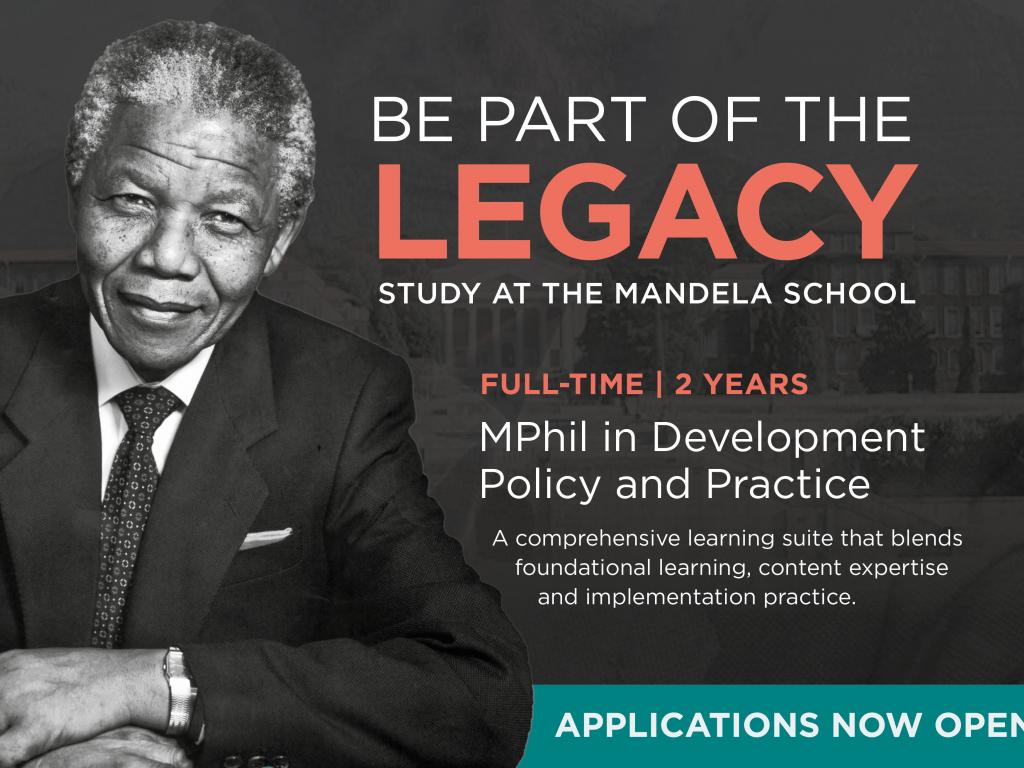The Nelson Mandela School offers dynamic and contemporary postgraduate programmes

Africa is at a crossroads of major transformations, making it an exciting terrain to learn, understand and innovate. To achieve these transformations, the continent requires accountable and capable African public institutions and ethical leadership.
In pursuit of the African Union’s Agenda 2063 and the University of Cape Town’s Vision 2030 of unleashing human potential to create a fair and just society, the Nelson Mandela School of Public Governance provides learning opportunities to build the capability and capacity of leaders and democratic institutions for achieving democratic governance, public policy implementation and sustainable development.
The Nelson Mandela School offers diverse, dynamic, and contemporary two-year graduate academic programmes that provide a highly rewarding learning experience for both part-time and full-time students.
Part-time studies
The part-time Master of Development Policy and Practice comprises two fortnightly teaching blocks per year and is designed for mid-career public sector and other practitioners. Since its inception seven years ago, this flagship programme has enrolled and graduated practitioners from over 15 African countries.
Full-time studies
The full-time programme, launched in 2021, caters for those early in their career trajectories, with time to devote to full-time study.
In pursuit of the African Union’s Agenda 2063 and the University of Cape Town’s Vision 2030 of unleashing human potential to create a fair and just society, the Nelson Mandela School of Public Governance provides learning opportunities to build the capability and capacity of leaders and democratic institutions for achieving democratic governance, public policy implementation and sustainable development.
The Nelson Mandela School offers diverse, dynamic, and contemporary two-year graduate academic programmes that provide a highly rewarding learning experience for both part-time and full-time students.
Part-time studies
The part-time Master of Development Policy and Practice comprises two fortnightly teaching blocks per year and is designed for mid-career public sector and other practitioners. Since its inception seven years ago, this flagship programme has enrolled and graduated practitioners from over 15 African countries.
Full-time studies
The full-time programme, launched in 2021, caters for those early in their career trajectories, with time to devote to full-time study.
Both programmes offer a unique opportunity to engage in current debates and knowledge on public leadership, policymaking and implementation, governance, African economic development, climate change, gender and development, social policy analysis, and research design and methods.
PhD Programme
In addition to these structured coursework programmes, the School welcomes applications from prospective doctoral candidates for its PhD programme. The doctoral programme combines intensive personalised supervision with robust research and can be augmented where necessary with appropriate coursework from any of the Masters programmes. Given the interdisciplinary nature of the School, the doctoral programme offers great flexibility in research areas and topics, access to highly competent supervisors from different disciplines, and a strong orientation towards current development policy and practice.
Teaching Philosophy and Methods
The Mandela School is committed to building transformative pedagogies, which have at their centre the core values of social justice and democratic ideals. The School’s pedagogy seeks not only to convey information and knowledge but also to facilitate cognitive, conceptual, and behavioural change.
The academic degree programmes and courses provide a comprehensive learning suite that blends multidisciplinary foundational learning with content expertise and implementation practice.
The School is also committed to continuous development of its coursework offerings, building in new thematic foci and content areas to meet the changing needs of contemporary African realities. In this regard, the School is working towards integrating other knowledge areas into the current Academic Programme in the near future. These include public health, early childhood development, local governance, and decolonisation and development (including decolonial feminist theory).
In addition to these structured coursework programmes, the School welcomes applications from prospective doctoral candidates for its PhD programme. The doctoral programme combines intensive personalised supervision with robust research and can be augmented where necessary with appropriate coursework from any of the Masters programmes. Given the interdisciplinary nature of the School, the doctoral programme offers great flexibility in research areas and topics, access to highly competent supervisors from different disciplines, and a strong orientation towards current development policy and practice.
Teaching Philosophy and Methods
The Mandela School is committed to building transformative pedagogies, which have at their centre the core values of social justice and democratic ideals. The School’s pedagogy seeks not only to convey information and knowledge but also to facilitate cognitive, conceptual, and behavioural change.
The academic degree programmes and courses provide a comprehensive learning suite that blends multidisciplinary foundational learning with content expertise and implementation practice.
The School is also committed to continuous development of its coursework offerings, building in new thematic foci and content areas to meet the changing needs of contemporary African realities. In this regard, the School is working towards integrating other knowledge areas into the current Academic Programme in the near future. These include public health, early childhood development, local governance, and decolonisation and development (including decolonial feminist theory).
Postgraduate admissions
Follow this link to apply - 2022 applications are now open. Closing date: 15 January 2022.
